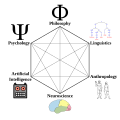The cultural cognition of risk, sometimes called simply cultural cognition, is the hypothesized tendency to perceive risks and related facts in relation...
23 KB (2,677 words) - 13:22, 24 May 2025
The cultural theory of risk, often referred to simply as Cultural Theory (with capital letters; not to be confused with culture theory), consists of a conceptual...
16 KB (1,921 words) - 00:56, 22 January 2024
Dan Kahan (category Law clerks of the Supreme Court of the United States)
cultural cognition, which is the study of how individuals form beliefs about the amount of risk in certain situations based on their preconceived cultural group...
13 KB (1,622 words) - 19:46, 27 January 2025
Changing Nature of Contemporary Risk". Global Society. 21 (1): 119–30. "First National Risk & Culture Study". The Cultural Cognition Project at Yale Law...
22 KB (2,761 words) - 23:20, 24 May 2025
PMID 26161886. S2CID 36939277. Shepherd, Hana (March 2011). "The Cultural Context of Cognition: What the Implicit Association Test Tells Us about How Culture...
44 KB (6,019 words) - 05:22, 23 May 2025
Metacognition (redirect from Meta-cognition)
thinking. Flavell defined metacognition as knowledge about cognition and control of cognition. For example, a person is engaging in metacognition if they...
79 KB (10,084 words) - 03:54, 26 May 2025
Embodied cognition represents a diverse group of theories which investigate how cognition is shaped by the bodily state and capacities of the organism...
178 KB (21,081 words) - 04:19, 28 May 2025
Thinking, Fast and Slow (redirect from System 1 (cognition))
S2CID 149090700. Gardner, Lisa A. (2012). "Review of Thinking, Fast and Slow". The Journal of Risk and Insurance. 79 (4): 1143–1145. doi:10.1111/j.1539-6975...
36 KB (3,980 words) - 10:14, 21 May 2025
Animal cognition encompasses the mental capacities of non-human animals, including insect cognition. The study of animal conditioning and learning used...
123 KB (15,111 words) - 17:46, 22 May 2025
Primate cognition is the study of the intellectual and behavioral skills of non-human primates, particularly in the fields of psychology, behavioral biology...
37 KB (4,622 words) - 17:47, 25 May 2025
decisions under risk: Intuition rather than deliberation drives advantageous choices". Cognition. 250: 105837. doi:10.1016/j.cognition.2024.105837. Bajtelsmit...
87 KB (10,440 words) - 22:41, 16 May 2025
Terror management theory (category Cognition)
unconscious resonance of death-related cognition promotes self-oriented defenses directed toward maintaining, not one's health, but a sense of meaning and self-esteem...
79 KB (9,932 words) - 23:01, 25 May 2025
Linguistic relativity (redirect from Principle of linguistic relativity)
cognition. One form of linguistic relativity, linguistic determinism, regards peoples' languages as determining and influencing the scope of cultural...
102 KB (12,255 words) - 01:41, 24 May 2025
Cultural heritage is the heritage of tangible and intangible heritage assets of a group or society that is inherited from past generations. Not all heritages...
37 KB (3,847 words) - 12:31, 25 May 2025
include carbohydrates, proteins, and fats. Each macronutrient can impact cognition through multiple mechanisms, including glucose and insulin metabolism...
28 KB (3,091 words) - 22:08, 23 May 2025
Organizational culture (redirect from Cultural web)
Council study found that cultural traits such as risk taking, internal communications, and flexibility are important drivers of performance. Furthermore...
79 KB (9,223 words) - 04:38, 1 June 2025
Schizophrenia (redirect from Societal and cultural aspects of schizophrenia)
risk factors are linked to deficits in cognition and social cognition including facial perception and insight that are in part included in theory of mind...
178 KB (19,407 words) - 11:28, 29 May 2025
of historical processes Cognitive ecology – Branch of ecology studying cognition in social and natural contexts Cultural group selection – Model of cultural...
41 KB (4,854 words) - 15:37, 23 May 2025
neurobiological effects of physical exercise involve possible interrelated effects on brain structure, brain function, and cognition. Research in humans has...
93 KB (9,595 words) - 21:32, 22 May 2025
of those influences. Implicit cognition is everything one does and learns unconsciously or without any awareness that one is doing it. An example of implicit...
35 KB (4,529 words) - 23:13, 26 May 2025
Cultural imperialism (also cultural colonialism) comprises the cultural dimensions of imperialism. The word "imperialism" describes practices in which...
63 KB (7,879 words) - 21:35, 24 May 2025
Functional neurological symptom disorder (category CS1 maint: DOI inactive as of November 2024)
process affecting the structure of the body, yet the person experiences symptoms relating to their body function. Symptoms of functional neurological disorders...
23 KB (2,478 words) - 02:01, 16 May 2025
Cognitive science (redirect from History of cognitive science)
study of the mind and its processes. It examines the nature, the tasks, and the functions of cognition (in a broad sense). Mental faculties of concern...
74 KB (8,629 words) - 22:35, 23 May 2025
Paranoia (redirect from Paranoid social cognition)
the cause of paranoid cognitions is inside the head of the people (social perceiver), and dismisses the possibility that paranoid cognition may be related...
38 KB (4,493 words) - 07:47, 25 May 2025
whose cultural background and heritage may be at risk without additional financial support, or who traditionally lack access to mainstream cultural events...
9 KB (1,087 words) - 02:25, 7 November 2024
Cultural identity is a part of a person's identity, or their self-conception and self-perception, and is related to nationality, ethnicity, religion, social...
45 KB (5,619 words) - 20:59, 22 May 2025
Negativity bias (section Cognition)
something very positive will generally have less of an impact on a person's behavior and cognition than something equally emotional but negative. The...
42 KB (4,879 words) - 00:47, 25 May 2025
Koch, Manja; Jensen, Majken K. (2016). "Association of the MIND diet with cognition and risk of Alzheimer's disease". Current Opinion in Lipidology....
9 KB (1,012 words) - 14:01, 18 September 2024
cultural heritage by recognizing folklore as necessary to cultural identity. The General Conference determined that oral folklore could be at risk of...
13 KB (1,540 words) - 02:43, 25 May 2025














